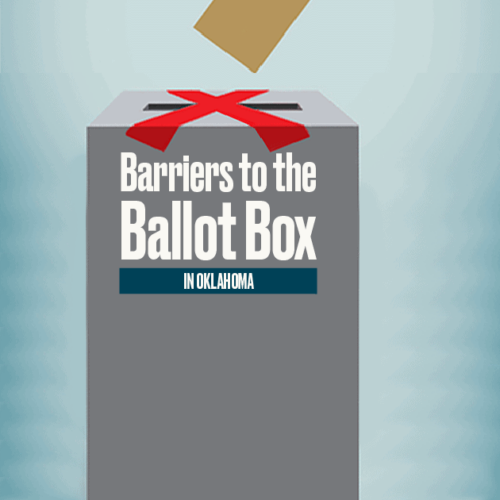Introduction
At the beginning of the pandemic, Oklahoma told its citizens they needed to seek out a notary if they wanted to vote by mail. After a successful lawsuit challenging that, and a counter-move by conservative lawmakers, they can now seek out a copy machine instead.
If they don’t get their ballots notarized, Oklahomans must submit a copy of their ID if they want their mailed-in votes to be counted this November.
Sign up for The Moment newsletter
Our CEO Susan Smith Richardson guides you through conversations and context on race and inequality.
“It’s another hoop that voters have to jump through,” said Jan Largent, president of the League of Women Voters Oklahoma, which was among the groups that sued over the notary requirement. “A lot of people I talk to on the phone, especially elderly people, don’t have working printers.”
Even with the requirement, a record number of Okies are expected to vote by mail in next month’s election. As of Oct. 21, the state had 329,000 requests for absentee ballots — already more than double the record number of requests in the June primary, which also had the ID copy requirement — and more than 180,000 ballots mailed back to the state, said Misha Mohr, a spokesperson for the State Election Board.
Here’s a look at some of the most significant updates to voting access in the state:
Absentee ballots
The League of Women Voters and two individuals sued in April over a requirement that voters notarize their absentee ballots in the midst of a pandemic. They asked the state’s Supreme Court to allow Oklahomans to use another provision in existing law, in which voters would sign an affidavit under penalty of perjury when returning their absentee ballots. The court ruled in their favor in May.
But Republican lawmakers stepped in to change the law, restoring the notary requirement while allowing voters to submit copies of their IDs instead of notarization in times of official emergencies such as the coronavirus pandemic.
Though the state will accept federally issued tribal IDs and county-issued voter IDs in addition to state-issued IDs such as driver’s licenses, some worry the requirement is an extra hurdle that could discourage voting. Two Democratic groups sued over the rules in May, but a federal judge decided against them last month. Judge John Dowdell, an Obama appointee, ruled that though the concerns for the elderly and those at high risk of severe complications from COVID-19 were “justified,” Oklahoma’s requirements were a “minor burden” also justified by the state’s need to promote confidence in election results.
“The virus is not under control in Oklahoma,” Dowdell wrote. “However, the state has put in place alternatives that do not necessarily require that voters have direct contact with others in order to cast an absentee ballot.”
The state’s election board posted on its website a list of libraries, banks and other businesses offering free ID copies or notary services, some of which are offering drive-up, contactless services.
Oklahoma did not preemptively mail ballots or ballot applications to voters, as some states did this year. Oklahomans have until Oct. 27 to request an absentee ballot from the state — a date so late, Largent worries that people who wait until then won’t be able to receive a ballot and mail it back in time for it to be counted.
Officials urged citizens to mail the ballots as early as possible, giving the U.S. Postal Service time to process an expected onslaught. Mohr said voters who need ballots sent long distances should use “good common sense” and that they can return ballots in person until Monday, Nov. 2.
Oklahomans have had to show ID to vote in person since 2010, when nearly 75 percent of voters approved a ballot measure requiring it. The Oklahoma Supreme Court upheld the measure in 2018, saying that although there was no evidence of in-person voter fraud in the state previously, the law was meant as a preventive measure. Oklahoma has had a brush with absentee voting fraud, however: In 1983 the Oklahoma House Speaker was charged with harvesting illegal absentee ballots. “Government witnesses said that votes were for sale for $5 or a bottle of liquor,” the New York Times reported.
Voter registration
The deadline to register to vote in Oklahoma was Oct. 9 — earlier than in many other states. And voters can’t register on Election Day at their polling places, nor could they register online, as in many other states.
Oklahoma passed a law to allow online voter registration in 2015, but the state has yet to implement it. Mohr said the State Election Board is waiting for the agency overseeing Oklahoma driver’s licenses to upgrade its computer systems and fully implement Real ID changes required by the federal government. (Oklahoma is one of the last states to make such changes.) Late 2021 is the earliest the election board is likely to offer online registration, Mohr said, saying a new system will also require testing.
“Security is our No. 1 priority,” she said.
For now, voters can fill out the registration form online but must print it out and sign it — another step of the process in which those without a printer or copier would need to venture out into the community.
Finding polling places
Tulsa County Election Board Secretary Gwen Freeman recently warned KTUL News Channel 8 that polling places could have changed due to the pandemic and urged voters to confirm the location of their local precinct online. Thirty in Tulsa County had changed prior to the June primary.
But the Oklahoma State Election Board also warned voters Monday that some people were receiving false text messages telling them their polling places had changed. County election boards notify voters by mail of such a change. Oklahomans should use the OK Voter Portal to double-check where they should cast their votes, officials said.
Changes to polling places can depress turnout, experts have said. A Center for Public Integrity investigation found that polling place changes after floods overwhelmed one Louisiana parish in 2016 affected a greater share of black voters than white voters.
Read more in Money and Democracy
US Polling Places
In North Carolina, court decisions favor voter enfranchisement
Still, voter-rights advocates fear counties may not follow decisions or state directives.
US Polling Places
Colorado’s voting laws are a model for other states looking to expand access
People with felony convictions are still not allowed to vote.


Join the conversation
Show Comments